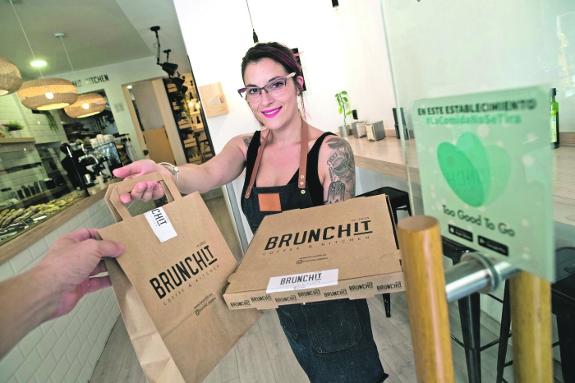

Secciones
Servicios
Destacamos

JUAN SOTO
Thursday, 22 August 2019, 19:22
In a country where 1.4 million tonnes of food were wasted last year, mainly due to surpluses in the hospitality sector, around thirty shops and restaurants in Malaga have joined the Too Good To Go movement against food waste. Now, thanks to the development of a mobile 'app' that works in nine countries around the world, the leftover food no longer ends up in the bin but in the hands of consumers, who can buy the leftover produce at reduced prices.
This environmental protection movement was born in Denmark in 2016, where several friends decided to create a platform and make it available to shops and restaurants after seeing how much food was thrown away at the end of a party.
Carlos García, who is one of the heads of the company in Spain, explains that on the application there are many fruit shops, bakeries and restaurants, although the app is open to any type of company that has surplus food, such as hotels or supermarkets.
Too Good To Go in Malaga
In Malaga they have been operating since last May and already offer several different types of products to customers thanks to geolocation. The function of the app is very simple: customers access the business that interests them and then they receive a surprise pack that the store or restaurant will deliver shortly before closing time. The packages will be made up of leftovers from the same day and customers will benefit from a much lower price, around a third of the retail price.
Although details are not listed by province, the company says it has 400,000 registered users and about 1,300 establishments nationwide. Since it launched last September, it claims to have saved about 200,000 meals.
"Our intention is that customers make use of the food, not wasting what can be eaten, just like our grandmothers did," summarises Carlos Garcia.
The businesses that have already joined this initiative value the possibility of reducing the surplus of food each day. Lydia Nieto, manager of Brunchit, a business with several stores in the city centre, explains that they were "very sorry" to have to throw away food in perfect condition, so the implementation of this app put their minds at ease that they are not wasting product.
"When you prepare food you never know if it's all going to sell or not, so at least we now know it's not going to end up in the bin," she explains.
European mentality
At Brunchit, pizzas and focaccias are their main sellers and their clients tend to be students and university students with a very European mentality.
"This project serves to raise public awareness and to help the environment, since food is precious and should not be thrown away" explains the manager.
Mario Ruiz, head of Stop&Sushi, sells the remaining sushi trays at reduced prices at the end of each day, and he agrees with Lydia.
"We almost always sell all the trays every day because it is a top quality product, we cannot save any leftovers for the following day because of the rules governing food hygiene," he says. In his case, he explains that this service also allows has a social aspect to it, because thanks to the reduced prices he is able to reach clients who cannot normally afford a sushi tray.
"It is true that for us this is an extra sale, but it also serves to avoid throwing away food that can benefit many families".
Surprise packages
Too Good To Go explains that businesses offer surprise packages because they never know what food is going to be left over every day. In fact, the establishments themselves can vary their daily number of packages depending on the demand they have experienced.
"If a customer has reserved a package and at the end of the day the business has nothing left over, they get their money back instantly," they say.
In the same way they explain that their objective is to continue growing and reach hotels and supermarkets (some already offer immediate products at a lower cost). Oriol Reull, director of Too Good To Go in Spain, explains that food waste is already the third largest source of CO2 and that his main challenge "is to make food produced equal to food consumed, therefore minimising the environmental impact".
By way of comparison, he says that "saving a single loaf of bread is equivalent to saving the CO2 emitted by a car after travelling a kilometre".
Publicidad
Publicidad
Publicidad
Publicidad
Esta funcionalidad es exclusiva para registrados.
Reporta un error en esta noticia

Debido a un error no hemos podido dar de alta tu suscripción.
Por favor, ponte en contacto con Atención al Cliente.

¡Bienvenido a SURINENGLISH!

Tu suscripción con Google se ha realizado correctamente, pero ya tenías otra suscripción activa en SURINENGLISH.
Déjanos tus datos y nos pondremos en contacto contigo para analizar tu caso

¡Tu suscripción con Google se ha realizado correctamente!
La compra se ha asociado al siguiente email
Comentar es una ventaja exclusiva para registrados
¿Ya eres registrado?
Inicia sesiónNecesitas ser suscriptor para poder votar.